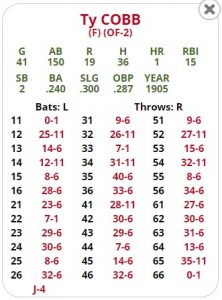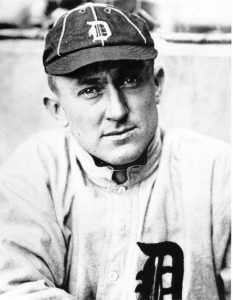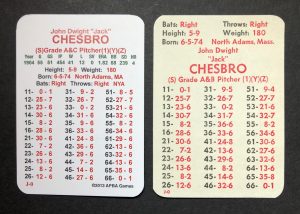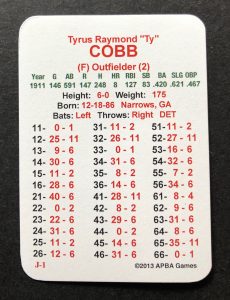
Without a doubt, this is the worst Ty Cobb card you will ever see. For most mortals, it’s not a terrible card. Yet for an eighteen-year old Cobb, it represents the ONLY time in his twenty-four year career that he didn’t hit .300. Two years removed from this card, Cobb would win the AL batting title NINE years in a row, and TWELVE of the next thirteen seasons. He would hit over .400 three times and win the Triple Crown in 1909. When he was elected to the Baseball Hall of Fame in 1936 on his first ballot, he received 98.2% of the vote. So, all the Yankee fans complaining that Derek Jeter didn’t get elected unanimously can shove it. If one of the top three players in the history of baseball can’t get elected unanimously, then the seventh best shortstop to play the game has no argument.

Considering the tragedies Cobb had endured just three weeks before his debut with the Detroit Tigers, it’s amazing he was able to focus and play at even an average level. In early August 1905, Cobb’s mother shot and killed his father with a pistol her husband had bought for her. The elder Cobb thought his wife was cheating on him. As he was sneaking past their bedroom window hoping to catch his wife with another man, she shot him, thinking he was an intruder. She was charged with murder and released on bond. However, the nightmare continued until March 1906 when she was finally acquitted after it was determined she acted in self-defense. Cobb attributed his aggressive style of play to his father, who never got to see him play. He said he felt his father was always watching him and he never wanted to let him down.

On August 30, 1905, Ty Cobb made his Major League debut, starting in centerfield for the Tigers against the New York Highlanders. Cobb was the youngest player in the league by nearly a year. His first at-bat was against Jack Chesbro, who was coming off a 41-win season. The youngster wasted no time in collecting his first Big League hit, doubling off Chesbro in his first at-bat. He would collect 4,190 more hits before he called it quits in 1928 with a .366 career batting average, the highest in history.
The game makers were kind to the Georgia Peach with this first APBA card. I project it to produce a .264 average, which is much better than the .240 he actually hit. As is the case with many deadball era cards, they frequently get an extra 7 to help offset the abundance of A pitchers they’ll face in a replay. If Cobb had one fewer 7, this card would hit .235. One surprising thing about this card is the lack of a first column 11 or 10 since Cobb led the AL in steals six times and swiped 896 career bags. Without a doubt, this card was just a small glimpse of what was to come.

It can’t be overstated how dominant Ty Cobb was in his era. As a matter of fact, the years from 1909 to 1919 many baseball historians refer to it as the “Cobbian game.” Playing in a time when it was legal for pitchers to doctor the ball and games were played in less than ideal lightning conditions and on poorly maintained fields, Cobb hit 112 points higher than the average hitter. Among many dominant seasons, Cobb’s best was in 1911, when he hit .420 with a league leading 47 doubles, 24 triples, and 86 stolen bases. For the year, he had a 1.086 OPS. Amazing. There’s nothing like a card with a 13-9, 61-8, and 62-9. Plus, it’s got four 31s and ZERO 13s, so it’s a great hit & run card.
In the 59 years since his death, Ty Cobb’s reputation has been decimated by Al Stump and others. I mentioned this fact in the Final Card Friday article I wrote on Cobb a year ago. As I did in that article, I urge you to read Charles Leerhsen’s book Ty Cobb: A Terrible Beauty. It gives a broad and balanced portrayal of a complicated man.




Excellent article Kevin. I agree wholeheartedly. I would have loved to see him play (I would love to see a 1909 game).